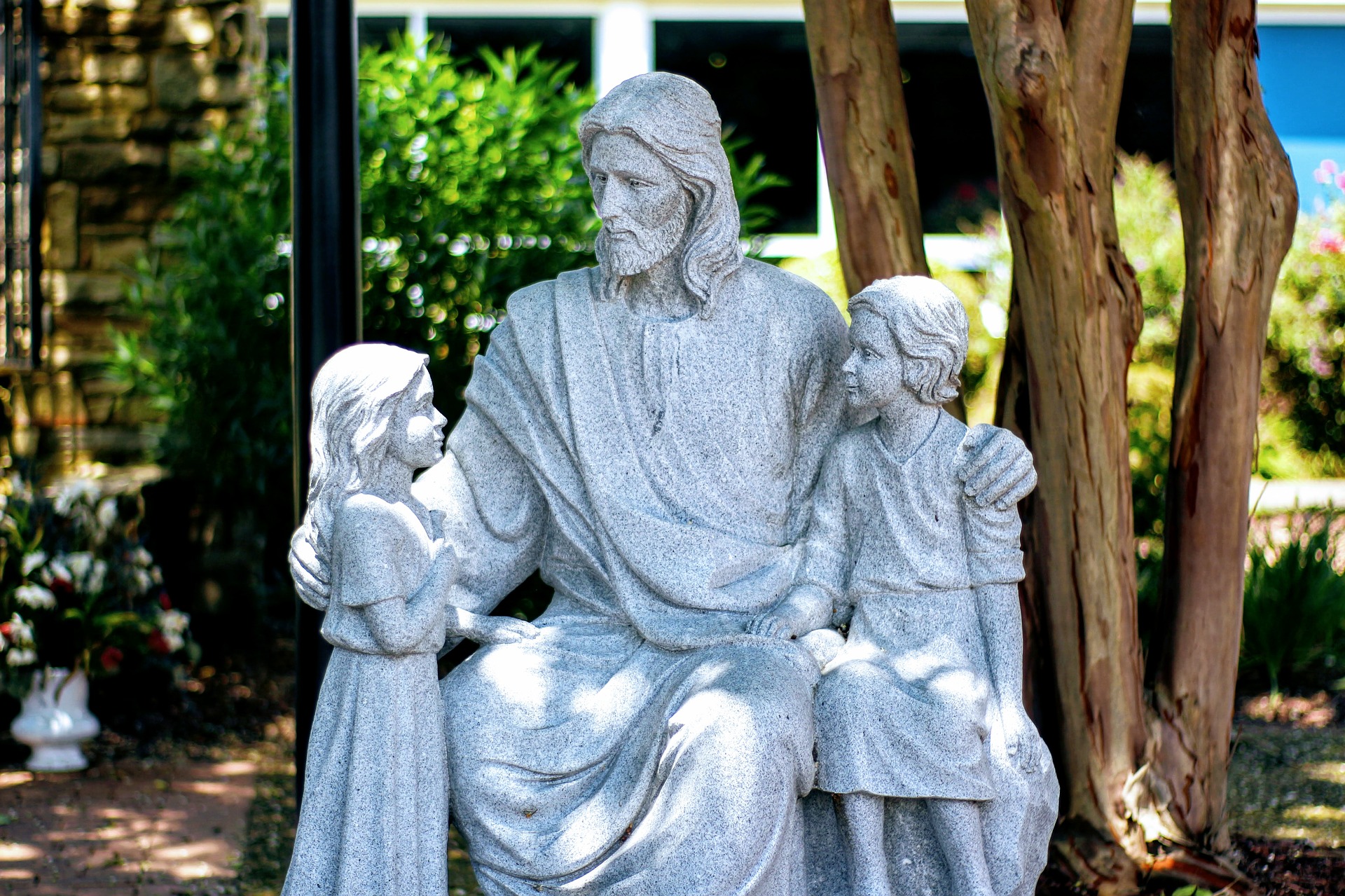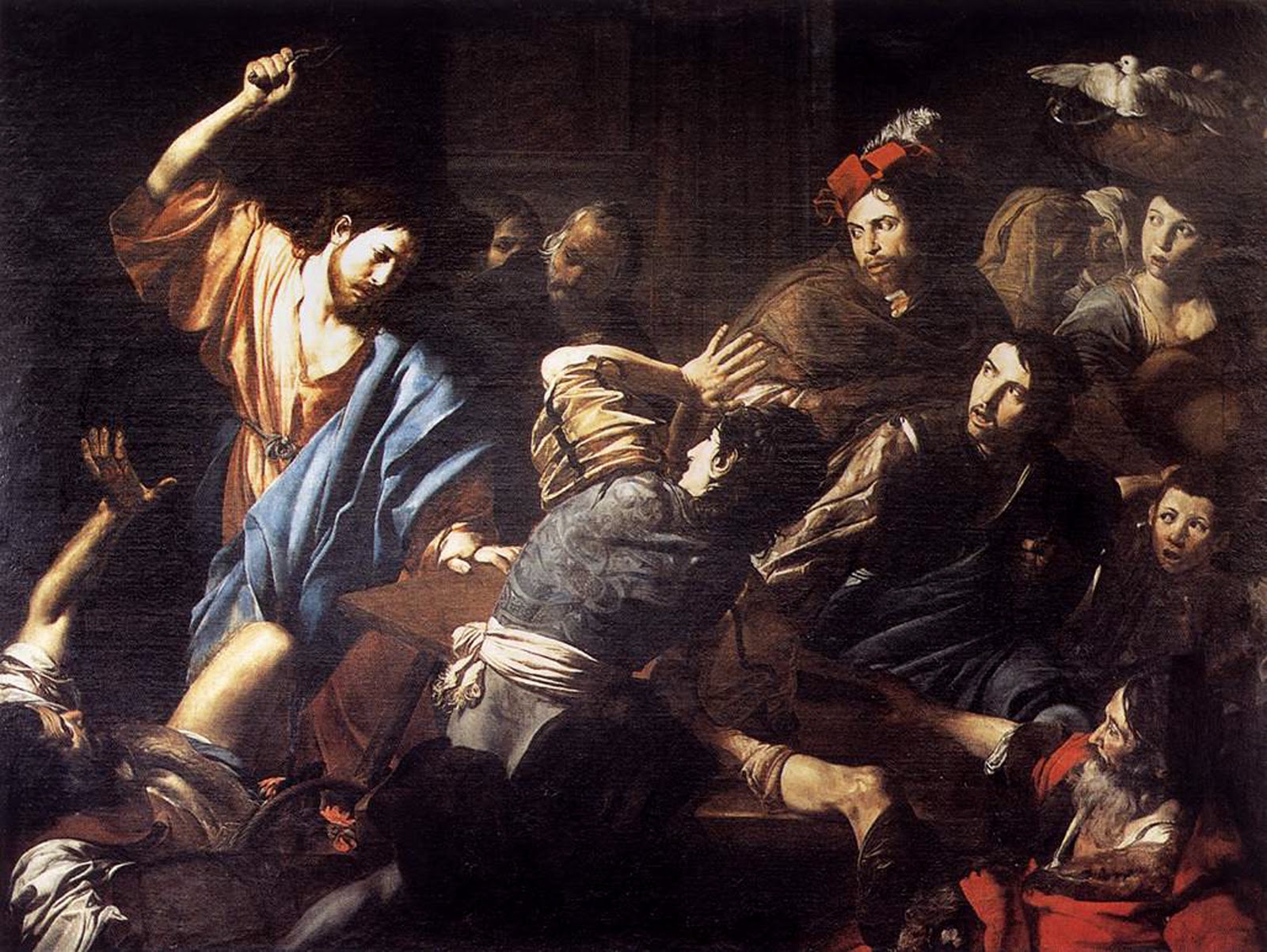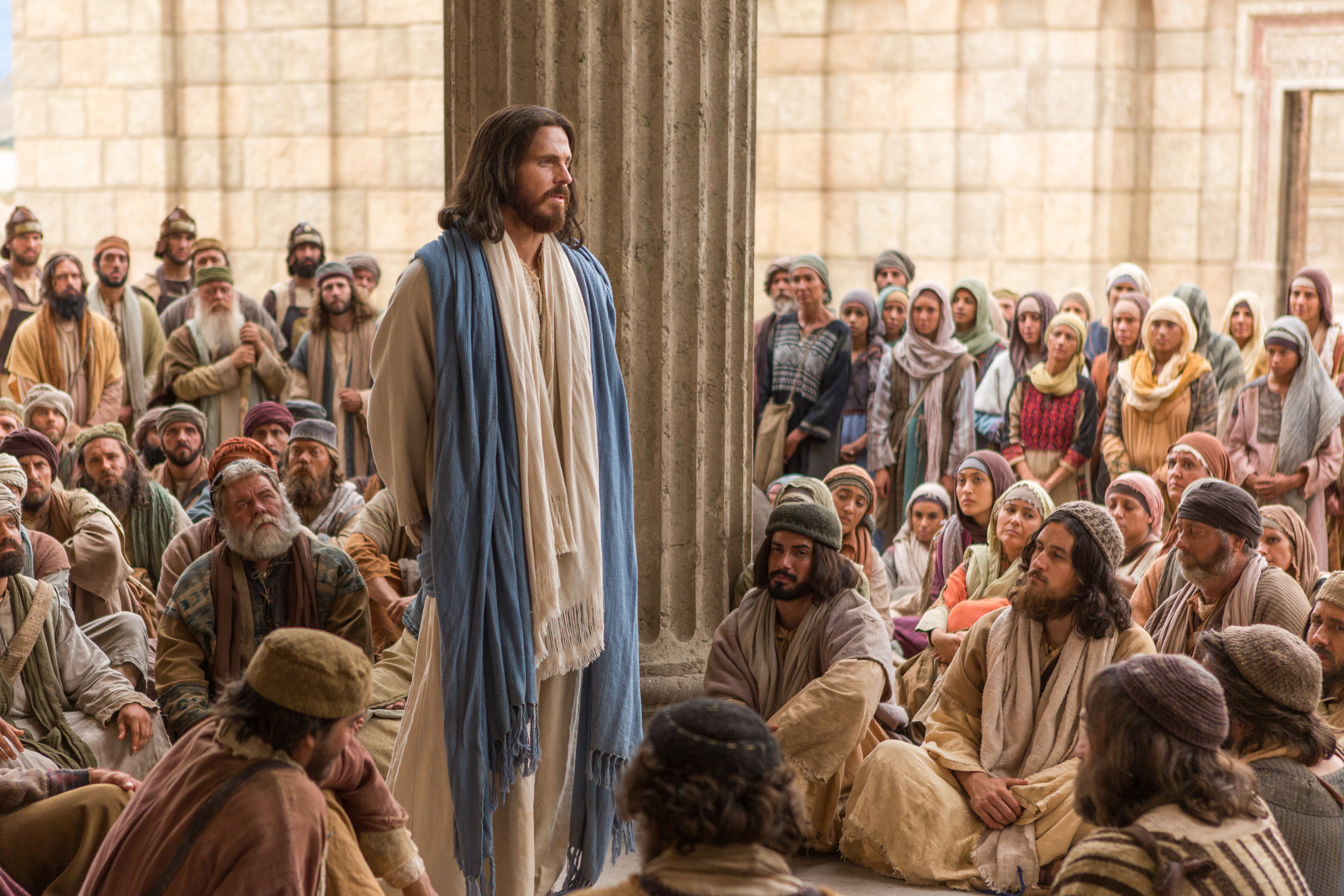In the first two verses of Galatians, Paul renounced the forces which constrain and control humankind – conformity and authority. In their place, he introduced a new order that promotes individual expression and social cohesion – the divine family. As we move into verse three, we’ll see begin to see some of the implications of leaving human society to join God’s family.

One nation | Two worlds
The New Testament writers seem to have sorted the diverse population of the Roman Empire into two major categories, Jews and Greeks. Consider this instance from Acts 14:1-2:
At Iconium Paul and Barnabas went as usual into the Jewish synagogue. There they spoke so effectively that a great number of Jews and Greeks believed. But the Jews who refused to believe stirred up the other Gentiles and poisoned their minds against the brothers.
Luke mentions only two kinds of people at the synagogue that day. These “Greeks” weren’t even Greek. They were from a region in modern day Turkey which at that time was called Galatia. It seems that to the first century Jews everyone else in the Roman Empire was a Greek regardless of their race. This may sound backward to our ears like calling everyone from below our southern border “Mexicans,” but I don’t think it was meant that way.
Luke and the other writers of the New Testament weren’t referring to race or nationality. When they referred to them as “Greek” they were thinking of a cultural distinction. Notice that Luke didn’t speak of Jews and Romans. While the Roman Empire was vast and diverse, almost everyone within it including Romans aspired to be culturally Greek. I say “almost everyone” because there was a sizeable group who resisted cultural assimilation – the Jews.
You lost me at hello

A seismic cultural shift has reshaped the landscape of my hometown over the past thirty years. An area previously comprised of nearly 100% southern whites now features taquerias every quarter mile. As an off-white foodie, I’m not complaining! I remember being shocked to discover that when Spanish-speaking people answer the phone, they don’t say, “hola,” the equivalent of our “hello.” They say, “bueno,” meaning “good.” That’s not just a linguistic difference; it’s a cultural one. Our cultures are rooted in our shared history and show up in our greetings. Did you know that “hello” came from trying not to get shot upon approaching a house in western frontier?
Our cultures also reflect our shared values as can be seen in ancient Greek and Jewish greetings. When Greeks met each other in the first century (and to a lesser degree today) they would say, “chaire,” which means something like, “rejoice.” I like that. I’ve taken to saying, “rejoice,” when I come into a room by which I mean, “Aren’t you glad I’m here,” but I don’t think that’s how the Greeks meant it. “Chaire” is the verb form of “charis,” which we translate, “grace.” In the Greco-Roman world, obtaining grace from the gods ensured a joyful life, which I think is why essentially the same word means, “grace” and “rejoice.” Perhaps, “chaire” as a greeting meant, “may you enjoy the gods’ favor.” It’s a kind wish and a great way to start a conversation off on the right foot.
The Jews on the other hand would greet one another with, “shalom,”1 which is commonly translated, “peace.” Nobody knows for sure how or when this greeting originated. It could have been a declaration of benign intent serving a purpose much like “hello,” but I don’t think that’s the case. “Shalom” does connote the absence of hostility, but that’s a secondary meaning to a much richer concept. The word more literally refers to “wholeness” or “integration.” When my body experiences shalom, I’m healthy. Shalom in relationships looks like mutual respect and shared goals. Societies demonstrate shalom through justice and security. When the resurrected Christ greeted his grieving disciples with “shalom aleykhem,” he must’ve meant more than, “I’m not here to hurt you.” I think he was reinforcing his people’s shared longing for the restoration of the created order.2
If I’m right about all of this, then the greetings of the Greeks and the Jews reveal two very different cultural aspirations. These fundamental differences meant that Jews and Greeks in first century Rome would never cohere into one society. During the time of Jesus and Paul, the two cultures coexisted on either side of a chasm which both had helped to dig.
The gospel invaded this rift to produce a third culture both open and offensive to the other two. We can feel its texture in Paul’s first “hello,” to the Galatians.
Here’s the passage:
Grace and peace to you from God our Father…
Galatians 1:3a (NIV)
The third way
I’m sure you see what Paul did there; he brought together the Greek and Jewish greetings into one. This was how Paul greeted his readers in all of his letters except the two to Timothy where he adds, “mercy.” And Paul wasn’t the only apostle to use it. Peter did in both of his letters. John used it too in 2 John and Revelation. The Christian movement in the first century wasn’t aimed at spinning off a new sect of Judaism or even spawning a new religion altogether. The early proclaimers of the message about Christ had their sights set on the foundation of a new, unified humanity called out from among all the peoples on earth. This compound greeting affirms the truth of the Galatians’ collective identity.

We might not be impressed with the coming together of people from various cultures into one nation in the land of e pluribus unum, but this was more than multiculturalism. We might allow Mexican people to celebrate Cinco de Mayo on US soil. Heck, we might even join them for the good food. What we won’t do is create a new “Independence Day” on May 4th or July 5th to celebrate the liberation of both nations from Europe. In his unified greeting, Paul insisted on equal status for everyone under God. “Grace and peace to you,” didn’t broker a compromise; it created something completely unique, but also familiar.
The churches in Galatia were new societies made up of people from both cultures to form a third, transcendent culture. Paul reworked the greetings of both the Greeks and the Jews to express the norms of the third culture. He deconstructed the Greek greeting, “rejoice,” to its basis, “grace.” I believe he had theological reasons for this especially in light of his message about grace. I think he also had a cultural reason to make the change. He reformatted the imperative verb form into a noun so that it would better compliment the Jewish greeting, “peace to you.” So, he included the greeting of the Greeks while making it culturally non Greek.
While he retained the format of the Jewish greeting, “peace to you,” he wrote it in Greek, a practice for which there is almost no precedent in contemporary Jewish literature.3 I’m inclined to think that this is because Greek-speaking Jews in Paul’s day continued to greet one another with the Hebrew, “shalom,” even if they proceeded to continue the conversation in Greek. It seems to me that since “shalom” had such a nuanced meaning, those who used it would be reluctant to translate it. Also, modern day English-speaking Orthodox Jews, continue to greet one another with “shalom aleykhem” rather than saying, “peace to you.” This seems to be true of orthodox Jews in every country around the world even if they’ve spoken the local language for generations. By writing “eirene humin,” Paul included Greeks into the history and hopes of Israel thereby erasing the distinction.
Paul’s greeting to the church reinforced the kingdom call for Greeks and Jews to contribute their cultural wealth to one new culture not beholden to either. Depending on your perspective, this is either a glorious hope or a treasonous threat. I always used to think that the persecution which Paul suffered throughout his ministry was due to his theology. Upon closer inspection of the New Testament, I no longer think that was the case.
In Acts 22, Paul makes a defense of his ministry before a mob of Jews in Jerusalem. He tells a fantastical tale of persecuting the church and then meeting Christ on the road. He identifies Jesus as The Righteous One of God. He relates the details of his baptism in Jesus’ name. Then, he tells of how Jesus warned him that the people who live in Jerusalem (his audience) were too stubborn to hear the message about their own messiah. Through all of this the mob listened quietly.
Then, he says:
“Then the Lord said to me, ‘Go; I will send you far away to the Gentiles.’ ”
Acts 22:21 (NIV)
Their reaction?
The crowd listened to Paul until he said this. Then they raised their voices and shouted, “Rid the earth of him! He’s not fit to live!”
As they were shouting and throwing off their cloaks and flinging dust into the air, the commander ordered that Paul be taken into the barracks.
Acts 22:22-24a (NIV)
They had tolerated his calling Jesus, “Adonai,” which was the word they used for God. His ascription of messianic language to someone they’d crucified didn’t draw their ire. They even put up with a personal insult supposedly from this crucified messiah. Nothing drew a response from them until he suggested that Gentiles could participate in the covenants of Israel. And what a response it drew! I don’t know about you, but I’ve never been so mad that I’ve reached down, clutched a handful of dust, and threw it into the air. This was a murderous, nearly animalistic rage. It serves to illustrate the human tendency to jealously guard our own cultural identity.
Even before this defining moment in Jerusalem, Paul knew the incendiary implications of his call to unity. In the Galatian letter itself, he spells out the reason he faced such hostility:
Brothers and sisters, if I am still preaching circumcision, why am I still being persecuted? In that case the offense of the cross has been abolished.
Galatians 5:11(NIV)
Maybe you struggle to understand why Paul’s message pushed godly people to murderous intent. Let’s go back to my illustration about Cinco de Mayo. How would you feel if a charismatic politician began gaining popular support to blend July 4th and May 5th into one holiday perhaps in June? Would you oppose it? On what grounds?
I use this example to illustrate the gospel call for people to dislodge from their cultural allegiances so they can embrace the new, free society. This call is at the very core of the work of Christ. Paul makes this explicit in Ephesians:
For he himself is our peace, who has made the two groups one and has destroyed the barrier, the dividing wall of hostility, by setting aside in his flesh the law with its commands and regulations. His purpose was to create in himself one new humanity out of the two, thus making peace,
Ephesians 2:14-15 (NIV)
Israel had long expected that the nations would come and join them in the worship of YHWH4, but they hadn’t considered the implications of that expectation for their cultural identity. As the apostle to the Gentiles, Paul didn’t teach those godless Greeks to say, “shalom,” rather he expected both sides of the divide to adopt a new greeting adapted from what was true in both.
Alternatively, Paul could have created a new greeting without reference to either Greek or Jewish culture and insisted that everyone use it, but that would have just produced another society based on conformity. Cohesion without conformity is part of the culture of the new society. I’m sure that Greek believers continued to greet other Greeks with, “chaire,” and Jewish believers continued to greet other Jews with “shalom.” To some extent these patterns are truly part of our identities as individuals. In the kingdom of God, every individual is equally valued and that includes their cultural leanings. At the same time, no culture is superior so nobody stands above anyone else. By greeting with “grace and peace to you,” Paul diminished any pretense of cultural superiority while at the same time valuing the differences between people.
The citizens of God’s new society are free from the conforming pressures of culture because the culture of God’s kingdom is unity in diversity. Can you imagine such a society? I hope so, because if you can, it means you had a pretty good upbringing.
Related opposites
I have two daughters and two sons.
They’re all pretty different from each other, but my two sons are opposites in almost every way. Caleb is a builder and fixer. Jadon tends to destroy things. Caleb avoids confrontation. Jadon thrives on it. Caleb doesn’t like to get dirty. Jadon doesn’t like to get clean. Caleb is a man of few words. Jadon talks when even when no one is around. They’re about as different from each other as any two people on this planet and yet they share one of the closest bonds that humans can share. They’re brothers.

As Paul continues in Galatians 1:3 we see that the “grace and peace” were offered on behalf of “God our Father.” I don’t think I could grasp unconditional love if I weren’t a parent. These people came into my house with nothing but needs and demands, yet I love them. Because I love them, I don’t want to confine them to some prefabricated notion of who they’ll be. If I did that, it would mean that I love the ideal of my child more than my child. Their individuality doesn’t make me love them less. It makes me love them more because I marvel in the one-of-a-kind person that God has produced from me and my wife. Don’t you think God our Father loves us at least that much? If we really believe that God is our Father we ought to express it through ever-deepening authenticity.
As a father who loves my kids as they are, I don’t impose prescribed expectations on them. What I do require is that they treat each other well and that they contribute to the good of the family. When Paul calls God, our Father, he’s not only affirming each person’s place before God as they truly are, he’s also implying our duty to each other. My children are stuck with each other for life because they share a common parentage. We are to embrace as spiritual family everyone whom our Father has adopted. We don’t get to set up additional stipulations. We must love them on the sole basis of shared spiritual parentage. In this way, we retain their freedom and our own.
Please hear what I’m saying. If we are going to be the same kind of Christians Paul was, we must be free from conformity and authority. This is so important to know because in my experience one of the best places to find conforming pressure and authoritarian leadership has been at church.
Why?
Because these social dynamics are powerful and predictable. If you want to start a church, you just need to master the art of building a cohesive culture among a bunch of people who find you credible. It works, but it’s the opposite of the new society which grows from the gospel.

I remember almost ten years ago meeting some people who were part of a former cult. In the mid nineties, Newsweek had named this movement the largest cult in America. In only fifteen years, this group had exploded in numbers from a single congregation of a few hundred to a worldwide movement with over one hundred thousand members. After moral failure among the top level leadership, the member congregations repented of some of their more authoritarian tendencies. Even though they were supposedly reformed, I could sense the hunger for proselytes still churning in their members.
Besides the excessive friendliness, I noticed something else strange about the couple who took a particular interest in recruiting my family. Their clothes were way out of fashion. When we accepted their invitation to dinner I realized that this wasn’t due to frugality. As I looked at pictures of the couple with their friends displayed around he house, I felt like I was looking back twenty years in time to the nineties. I asked my host when the photos were taken. He answered, “Last year.” Then I realized that the members of this cult had frozen in time. They had formed their picture of the Christian ideal from the people who’d led their movement in its ascendency – during the nineties.
I share this story to illustrate the danger of conformity in a church setting. Now, there’s nothing sinful (maybe) about dressing like the nineties, but it’s probably not helpful either. Imagine walking into a room full of people dressed that way. Would you feel like they’d discovered something transcendent or would you think they’d relinquished a part of themselves to a hive mind? Would you think they’d each found a personal faith or would you pity them as pathetic joiners? It’s possible to think you’re responding to God’s call when you’re really just following the crowd. It’s possible to tell yourself you’re in a spiritual family when you’re really in a cult. Healthy families promote diversity because they’re predicated on unconditional love. The church is supposed to be the ultimate family. If you’re in a group that discourages diversity, it’s not the church.
I’d love to discuss these ideas further, so leave me a comment!
Notes:
- The best evidence for the use of “shalom alykhem” as a greeting by Jewish people in the first century comes from the Gospels of Luke and John where Jesus is quoted as greeting his disciples with it after his resurrection. cf. Luke 24:36; John 20:19, 26
- Evidence of this shared hope can be found in Acts 3:19-21: “Repent, then, and turn to God, so that your sins may be wiped out, that times of refreshing may come from the Lord, and that he may send the Messiah, who has been appointed for you—even Jesus. Heaven must receive him until the time comes for God to restore everything, as he promised long ago through his holy prophets.
- The Dictionary of Paul and His Letters. p. 699
- Isaiah 2:1-5 as an example.
- Acts 15:36-41
























